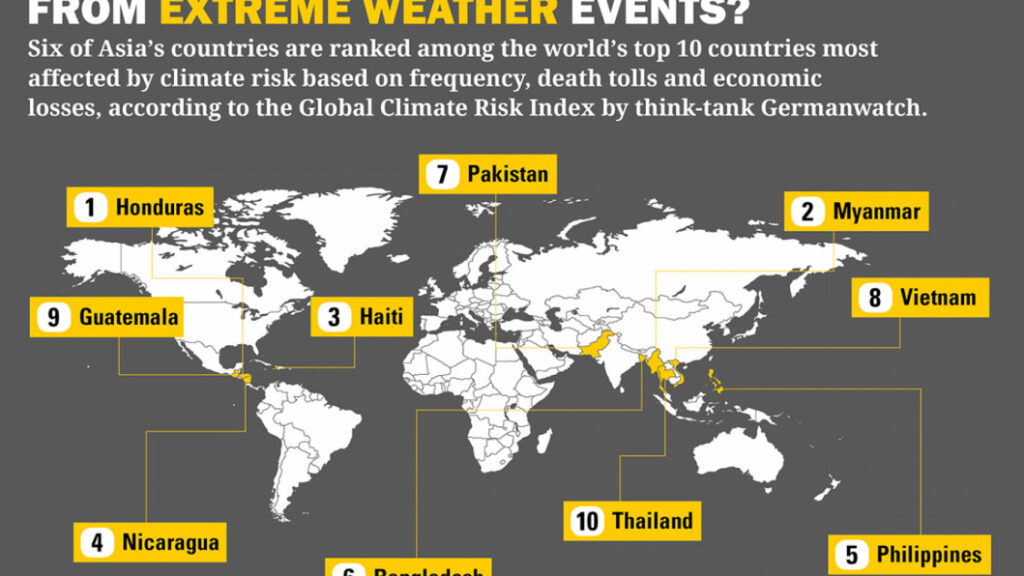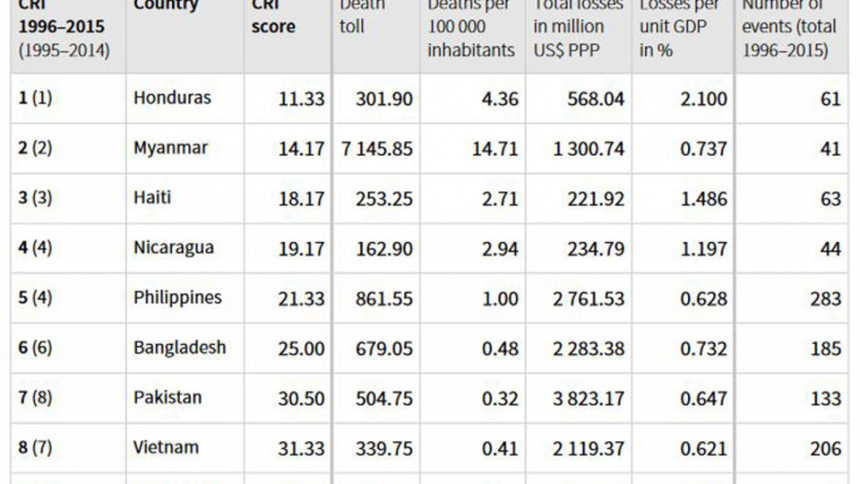
Caribbean and Indo-Pacific countries dominate the world’s top 10 countries most affected by extreme weather events in the last 20 years, according to the Global Climate Risk Index by think-tank Germanwatch.
Key messages
- According to the index, Honduras, Myanmar and Haiti were the countries most affected.
- In 2015, Mozambique, Dominica as well as Malawi were at the top of the list of the most affected countries.
- Altogether, more than 528 000 people died as a direct result of nearly 11 000 extreme weather events; and losses between 1996 a nd 2015 amounted to around 3.08 trillion US$ (in Purchasing Power Parities).
- The host region of the UN climate summit 2016 – the continent of Africa – is severely affected by climatic events with four countries ranking among the 10 countries worldwide most affected in 2015 – Mozambique (1st), Malawi (3rd), Ghana and Madagascar (joint 8th position).
- Precipitation, floods and landslides were the major causes of damage in 2015. A high incidence of extreme precipitation supports the scientific expectations of accelerated hydrological cycl es caused by climate warming.
- Most of the affected countries in the Bottom 10 of the long-term index have a high ranking due to exceptional catastrophes.
- Of the ten most affected countries, nine were developing countries in the low income or lower-middle income country group, while only one was classified as an upper-middle income country.
- The climate summit in Marrakesh is giving the “go-ahead” on developing the “rule-book” for the Paris Agreement, including the global adaptation goal, adaptation communication systems, and finance assessment systems for building resilience.
In Asia, Bangladesh ranks third after Myanmar, Philippines and is followed by Pakistan, Vietnam and Thailand, said the report.
Meanwhile, Central American country, Honduras has a long history of devastating natural calamities and remains most affected country in the world by extreme weather.

According to Global Climate Risk Index 2017′ estimates nearly 11,000 extreme weather events occurred between 1996 and 2015 which caused over 528,000 deaths worldwide, resulting in around US$3.08 trillion in associated financial loss.
Myanmar with a population of 53 million people is identified as the second most affected country in the last 20 years. It has seen a rise in temperature, increase in rainfall, storms, floods and most notably the devastating hurricanes like Nargis in which 2.4 million people were affected.
As a result of the significant degradation caused by over-exploitation of forest resources, soil, quarries and water resources, Haiti, the poorest country in the western hemisphere, is the third most vulnerable county affected by the climate change. Nicaragua with a population of 6 million has witnessed severe droughts and hurricanes like Mitch, one of the mostly deadly hurricanes of the modern times.
Philippines, located in the Western Pacific Ocean is at the fifth position on the risk index. The country has been particularly vulnerable to extreme weather and has suffered Violent storms like Typhoon Haiyan. The intensity of the tropical storms has increased over the years.
Increase in floods, rise in temperatures, heat waves and droughts portends the severe effects of the climate change in Pakistan, which is at seventh position on the risk index. Climate-induced migration has already begun in Pakistan as the droughts, floods and sea intrusion have impacted the livelihood of the local communities.
Increased urbanisation and rapid economic development has taken its toll on the climate of Vietnam, a country prone to natural disasters. The country has seen an increased frequency of natural disasters causing huge human and property losses.
Guatemala, a country positioned in an earthquake and hurricane zone has already been seeing the drastic effects of climate change. The yields of staples have fallen dramatically due to the severe droughts storms.
Thailand with floods, hurricanes and critically low levels of water reservoirs has been disproportionately affected by the effects of the climate change.
Germanwatch has been actively promoting global equity and the preservation of livelihoods since 1991.
Copyright: dataLEADS/ Asia News Network




